Words of St. Francis
For those God foreknew, He also predestined to be conformed to the likeness of His Son, that He might be the firstborn among many brothers. And those He predestined, He also called; those He called, He also justified; those He justified, He also glorified.
– Romans 8:29-30
On a certain occasion when St. Francis was suffering extraordinary physical pain, one of his religious brothers, meaning to sympathize with him, said in his simplicity, ‘My father, pray to God that He treat you a little more gently, for His hand seems heavy upon you just now.’ Hearing this, St. Francis strongly resented the unhappy remark of his well-meaning brother, saying, ‘My good brother, did I not know that what you have just said was spoken in all simplicity, without realizing the implication of your words, I should never see you again because of your rashness in passing judgment on the dispositions of Divine Providence.’ Whereupon, weak and wasted as he was by his illness, St. Francis got out of bed, knelt down, kissed the floor and prayed thus, ‘Lord, I thank Thee for the sufferings Thou art sending me. Send me more, if it be Thy good pleasure. My pleasure is that You afflict me and spare me not, for the fulfillment of Thy holy will is the greatest consolation of my life.’
– St. Bonaventure
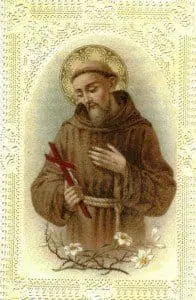
Lord, make me to know my end, and what is the measure of my days, that I may know how frail I am.
– Psalm 39:5
The mission that God entrusted to Francis, was made known to him gradually, and often in mysterious ways. When Francis was in Puglia on a military mission, he heard the voice of God telling him to return to Assisi and he would then be told what to do. He returned to Assisi at once. One day, while Francis was praying in a wayside church, in front of an ancient icon of Christ crucified, the image of Christ suddenly became alive and said to him, “Go and repair my Church, which you see is falling into ruin.” Francis interpreted the words in a literal way, and began repairing the church buildings in Assisi. Later, Christ revealed to Francis that he wanted him to restore the Church, not from without, but from within, that is, in the hearts and minds of the people. Francis’ obedience to the voice of grace within him, enabled him to follow the promptings of the Holy Spirit and to do untold good for the Church and for the world.
I heard the voice of the Lord saying, ‘Whom shall I send, and who will go for us?’ Then I said, ‘Here I am, Lord; send me.’
– Isaiah 6:8
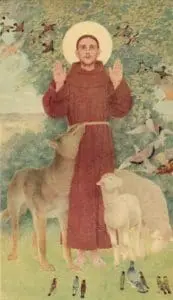
Francis had a vision of a little black hen, whose feathers and feet were those of a dove. She had so many chicks that she couldn’t gather them under her wings, and so they ran all around her, beyond her reach. The Holy Spirit revealed to him that the hen symbolized Francis himself. ‘I am that hen,’ Francis said, ‘because I am small in stature and dark, and because I am to be simple like a dove and fly heavenward on wings of virtue. The Lord, in his mercy, has given and will give me more children, which I could never care for by myself. I need, therefore, to surrender them to Mother Church, who will protect them and gather them under the shade of her wings.”
We know the love God has for us and we trust that love.
– 1 John 4:16
Francis named his religious order the Friars Minor (Little Brothers) to express his desire that the brothers would always remain humble and never seek positions above others. He encountered many difficulties along the way, as he tried to remain faithful to the inspiration that God had given him.
Once St. Francis had a vivid dream in which Jesus appeared to him and said, “Poor little man, why are you so sad? Is not your order, my order? Is it not I who am its chief shepherd? Cease to be afflicted, then and take care rather of your own salvation.” The dream was a great consolation to Francis.
Like living stones let yourselves be built on Christ as a spiritual house, a holy priesthood.
– 1 Peter 2:5
The Bishop of Assisi once said to Francis, ‘I think your life is too hard, too rough. You don’t possess anything in this world.’ And Francis replied, ‘If we had possessions, we would need weapons to defend them. They are frequently a source of quarrels and lawsuits. Possessions usually prove to be an obstacle in one’s search for God. That is why we do not desire temporal goods.’
For what will it profit a man to gain the whole world, and lose his own soul?
– Matthew 16:26
Francis used to say to the Brothers of his order, “Go, announce peace to all people; preach repentance for the remission of sins. Be patient in trials, watchful in prayer, and steadfast in weariness. Be modest in your speech, responsible in your actions, and grateful to your benefactors. And know that in return an eternal kingdom is being made ready for you.”
We are receiving a kingdom which cannot be shaken.
– Hebrews 12:28
“Riches prick us with a thousand troubles in getting them, as many cares in preserving them, and yet more anxiety in spending them, and with grief in losing them.” – St. Francis of Assisi
Holy Father, keep them in Your name that You have given me, so that they may be one just as we are. Consecrate them in the truth. Your word is truth.
– John 17:11,17
“St. Francis, the model of humility, wanted his brothers to be called ‘lesser’ and the superiors of the Order to bear the name, ‘servants,’ thereby preserving the very words used in the Gospel which he had promised to observe. At the same time he enabled his followers to learn from their very name that they had come to the school of the humble Christ to learn humility.”
– St. Bonaventure
For the gate is small and the way is narrow that leads to life, and there are few who find it.
– Matthew 7:14
When Francis was assailed by temptations, he would sometimes throw himself naked into a snow-filled ditch or roll in a thorny briar patch. He called his body, “brother donkey,” and denied himself many legitimate physical comforts.
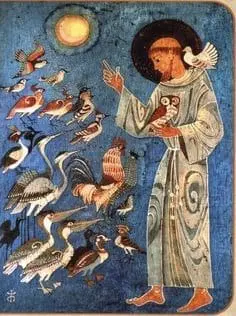
In later life, he would apologize to “brother donkey” for treating him so harshly. But God enlightened Francis to see the great value in a life of penance and reparation and his example has helped the whole world. He never proceeded in Holy Orders beyond the diaconate because he did not feel worthy of the honors of the priesthood. One of his outstanding virtues was his compassion, which reached out to all, but especially to the marginalized and the underprivileged. One of the biographers of Francis said of him, “Among the saints, he was the most saintly, and among sinners, he looked like one of them.”
I urge you, brothers and sisters, by the mercies of God, to offer your bodies as a living sacrifice, holy and pleasing to God, your spiritual worship.
– Romans 12:1
“Since spiritual joy springs from the heart’s innocence and the purity of incessant prayer, these are the two virtues we need to acquire and to keep. Then, that joy which I long to see and feel in myself and in others, that inward and outward joy, will be an edification to neighbor and a reproach to the enemy. For sadness is his and those who follow him. Rejoicing and always being happy in the Lord, is ours.”
– St Francis of Assisi
For this is the will of God, your sanctification.
– 1 Thessalonians 4:3
According to witnesses, Francis’ ability to preach was truly remarkable. It frequently happened that people who had no religious inclination whatsoever, experienced a sudden and total conversion, simply by listening to Francis proclaim the word of God. On one occasion, when he was preaching in Cannara, a village near Assisi, the people were so moved by his words that the entire congregation approached him and begged to be admitted to his Order. It was because of these requests that he began to think about plans for forming a Third Order.
Brothers, I want to remind you of the gospel I preached to you, which you received and in which you stand firm. You are being saved by it at this very moment.
– 1 Corinthians 15:1-2
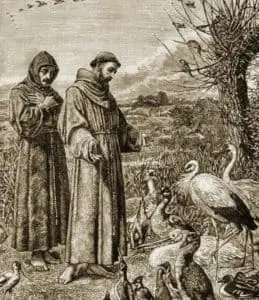
A chronicler, who witnessed one of Francis’ sermons at Bologna, left this account: “In A blue and white facebook logo with black background1222, on the feast of the Assumption (August 15) as I was a student in Bologna, I saw Francis preach in the marketplace in front of the courthouse, where nearly all the townspeople were gathered. His sermon was titled, ‘Angels, Men, and Devils.’ He treated his theme so wisely that many learned men who were present, were filled with admiration when they heard such words from the lips of an untutored friar. The whole matter of his discourse was directed to the quenching of hatred and the establishment of peace. His clothing was unattractive, his appearance insignificant, his face without beauty. But God inspired his words with such power that many noble families, torn apart by ancient blood feuds, were reconciled forever.
And all felt such great devotion and reverence for him that men and women in crowds, prevailed upon him, and tried to tear off bits of his habit or even to touch the hem of his garment.”
Strive for peace with everyone and for that holiness, without which no one will see the Lord.
– Hebrews 12:14
Once Francis was sitting in a boat near a port in the lake of Rieti. A fisherman who had just caught a large carp rowed over to the saint and kindly offered him the fish. Francis accepted it joyfully and gracefully, and immediately began calling it “Brother.” Then he placed the fish gently in the water and began praising the name of the Lord. But all the while Francis prayed, the fish continued to play beside the boat and would not leave until Francis finished his prayer and gave it permission to leave. And so it was that Francis’ total obedience to God gave him great dignity before creatures, who in turn obeyed him.
– Thomas of Celano
To be near God is my happiness. I have made the Lord God my refuge.
– Psalm 73:28
“The Brothers should guard against accepting churches, dwellings, even poor ones, and whatever else might be built for them, unless these are truly in keeping with the holy Poverty we have promised in the Rule, and let them always dwell there only as guests, as pilgrims and strangers.”
– The Testament of St. Francis
Whatever gains I had, these I have come to consider a loss because of Christ. More than that, I even consider everything as a loss because of the supreme good of knowing Christ Jesus my Lord. For His sake I have forfeited all things and I consider them so much rubbish, that I may gain Christ and be found in Him, not having any righteousness of my own based on the law but that which comes through faith in Christ – the righteousness that comes from God and is by faith.
– Philippians 3:7-9
There were many people who witnessed Francis’ extraordinary and supernatural rapport with the animal kingdom. It is recorded that he befriended a falcon, a lamb, a crow, a nest of robins, a pheasant, a cricket, and more. He performed a miracle in the city of Gubbio by taming a wolf that had been terrorizing the citizens there and during the winter time it was his habit to put honey into beehives to provide food for the half frozen bees. He would stoop to remove earthworms from his path so as not to crush them. At Lake Trasymene, he made friends with a wild rabbit who would not leave his side. It was for the turtle-doves that Francis built nests with his own hands. Francis found in all created things, a reflection of the Divine, and his love embraced even the most humble of creatures.
Even the sparrow has found a home, and the swallow a nest for herself, where she may have her young, a place near Your altar, O Lord Almighty, my King and my God. – Psalm 84:3
Thomas of Celano, who had been received into the Franciscan Order by Francis himself, was chosen by Pope Gregory IX to write the first biography of Francis’ life. Thomas began the writing shortly after Francis’ death in 1226, and the importance of his book lies in the fact that it was an eyewitness account. Thomas was a talented historian and author and in writing about Francis, he revealed him as a whole man, a man with both strengths and weaknesses. We owe to Thomas of Celano, many precious and tender stories of Francis, including the following: “He (Francis) overflowed with a spirit of love, not only for men who suffered, but also for dumb animals, reptiles, birds, and any other creature with or without consciousness. Above all, he loved little lambs with a special affection and love, for they showed forth the humility of our Lord Jesus Christ, since the scriptures, used the image of a lamb in describing him.”
The next day John saw Jesus coming unto him, and said, “Behold, the Lamb of God who takes away the sin of the world.”
– John 1:29
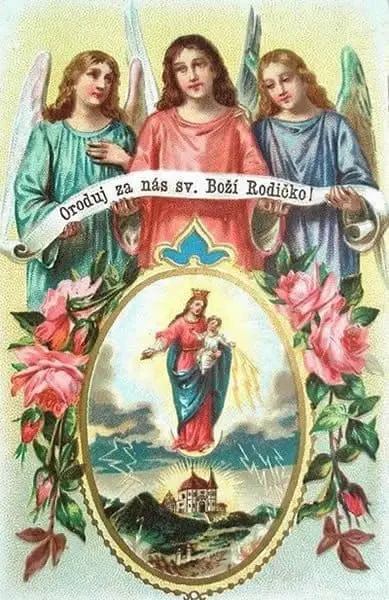
“…..St. Francis was like that. He loved creatures, not because they reminded him of human beings, but because they reminded him of God. Now what is this gift of simplicity, which we admire so much in children, because it is natural; which we admire so much in the saints, because it is supernatural….You see, there is only one Being who is absolutely simple; that is almighty God, and He knows everything. No, to be simple is to see things with the eye of God, that is to see them as they really are, without the trimmings.”
– Monsignor Ronald Knox
Not that I have already attained, or am already perfected; but I press on.
– Philippians 3:12
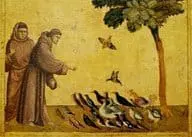
Once when Francis was traveling from Siena to the Spoleto Valley, he passed a large field where a number of sheep were grazing. When he spoke to the sheep, they ran over to him and began to bleat and raise their heads, seeming to communicate in their own way with him. The Vicar General of the Order and several of the Friars Minors were walking a short distance behind Francis and witnessed the scene. The Vicar General said to the friars who were with him, “Look at how the sheep respond to our holy father, Francis. Truly he is a man of God, that even insensible animals revere him and feel his love.”
We always thank God for you, mentioning you in our prayers. We continually remember before our God and Father, your work produced by faith, your labor prompted by love, and your endurance inspired by hope in our Lord Jesus Christ.
– 1 Thessalonians 1:2-3
In addition to the animal kingdom, Francis felt a strong kinship with the elements of the earth which he regarded as his brothers and sisters. He called the moon his “sister,” and the sun, his “brother.”
When I consider Your heavens, the work of Your hands, the moon and the stars, which You have ordained, what is man that You are mindful of him, and the son of man that You visit him? For You have made him a little lower than the angels, and You have crowned him with glory and honor.
– Psalm 8:3-5
He determines the number of the stars; He calls them all by name.
– Psalm 147:4
“We praise You, Lord, for Sister Water, who is very useful and humble and precious and chaste.”
– St. Francis of Assisi
When Francis and his followers numbered twelve, Francis drew up a short and simple Rule of life based on the Gospel teachings, and took it to Pope Innocent III in Rome, requesting approval. Pope Innocent III, who had great religious, social and political power, was not convinced that the small and insignificant looking Francis would have the ability to breathe new life into the Church through his Rule. He did not grant his approval. That night, Pope Innocent III had a dream in which he saw the Lateran Basilica in Rome going to ruin. It was about to topple over. Francis, the little poor man to whom he had just granted an interview, was holding up the entire Basilica on his shoulder. The dream caused the pope to change his mind and give Francis the approval he sought for his Rule. Step by step, God was leading Francis and opening the doors to the great mission that was given to him to fulfill.
Morning by morning, He wakens me and opens my understanding to His will.
– Isaiah 50:4
On one occasion, Francis was traveling in Tuscany with Brother Masseo. As they were walking, they came to a crossroad where three roads met. They could go to Siena, to Florence or to Arezzo. When Brother Masseo asked which road they should take, Francis replied that they would take the road that God willed. ‘But how will we know God’s will in the matter?’ Brother Masseo asked. ‘By the sign I will show you,’ Francis replied. He told Brother Masseo to twirl around in a circle, and not to stop until told to. He did as Francis asked and became very dizzy. Finally, Francis told him to stop. ‘What direction are you facing?’ Francis asked his companion. ‘Toward Siena,’ Brother Masseo replied. ‘That is the road God wants us to take,’ Francis said.
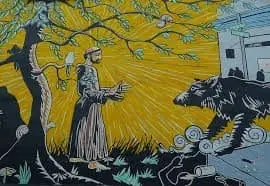
While they were walking toward Siena, Brother Masseo thought about what had just transpired. Why would Francis ask him to something that was so infantile? If anyone passing by on the road had seen him twirling around the way children do in their play, they would have considered him a common fool. Because he had such a great esteem for Francis, whom he revered as a saint, he did not dare ask him for an explanation. Many of Francis’ actions seemed absurd, but those who knew him, were aware of his close union with God. It was the Holy Spirit, guiding and enlightening him, that made his ministry to souls so fruitful. The time they spent in Siena proved to be a great blessing to the citizens of the town and many people received graces.
Your attitude must be that of Christ.
– Philippians 2:5
“When you look at a poor person, you are looking at a mirror of the Lord and His poor mother. So, too, in the sick, you are contemplating the kind of infirmities He took upon Himself for us.” – St. Francis of Assisi
For we brought nothing into the world, and we can take nothing out of it.
– 1 Timothy 6:7
There was a woman from a village near Arezzo who was pregnant. When the time came for her baby to be born, she was in labor for several days but unable to deliver the baby. She was hanging between life and death. Her relatives heard that Francis was going to pass through the village that day.They were aware of his reputation of holiness and had great faith in him. They were told that he was riding a horse because he was too weak and ill at the time to walk. They waited for him with great expectancy but he did not appear. They learned that he had taken another route through the village and they were deeply disappointed.They did however see his companion, Brother Peter, who was bringing the horse back that Francis had used for his journey. The townspeople wondered if they might be able to find something the saint had touched that could be of help to the dying woman. They realized that St. Francis had held the reins of the horse in his hands that day. Taking the reins, they laid them on the woman and she was immediately freed from the crisis and gave birth.
I have heard your prayers and seen your tears. I will heal you.
– 2 Kings 20:5
We need to be especially alert to the evil subtlety of Satan. His one desire is to keep people from having a mind and heart disposed to their Lord and God. . .He wants to extinguish the light of the human heart, and so he moves in by means of worldly busyness and worry.
– Rule of 1221
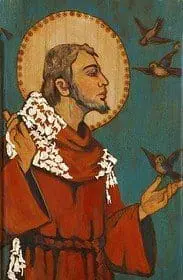
Our struggle is not with flesh and blood but with the principalities, with the powers, with the world rulers of this present darkness, with the evil spirits in the heavens. Therefore, put on the armor of God, that you may be able to resist on the evil day and, having done everything, to stand firm.
– Ephesians 6:12-13
Francis used to say, “If you, O servant of God, are upset, for any reason whatever, you should immediately rise up to prayer, and you should remain in the presence of the Most High Father for as long as it takes for Him to restore to you the joy of your salvation.”
– Thomas of Celano
You may for a time have to suffer the distress of many trials; but this is so that your faith, which is more precious than the passing splendor of fire-tried gold, may by its genuineness lead to praise, glory, and honor when Jesus Christ appears.– 1 Peter 1:6-7
“We praise You, Lord, for those who forgive for the sake of Your love and endure infirmity and tribulation. Blessed are those who endure in peace, because by You, Most High, they will be crowned.”
– St. Francis of Assisi
But a short time ago, mercy came to us from the Lord, our God, who left us a remnant and gave us a stake in His holy place.
– Ezra 9:8
When Cardinal Hugolin of Ostia first met Francis and the Friars Minor, he admired the great simplicity and humility of their lives. They lived in huts of wood and clay and slept on mounds of straw and broken pallets. They ate sparingly and only of very plain food. They spent their time in prayer, penance, manual labor, and preaching. They were always at the service of their neighbor, particularly lepers, and the sick poor. Francis chose the undyed and rough woolen tunics of the poorest peasants in Assisi to be the clothing of the Friars Minor. When Cardinal Hugolin saw how poorly the Brothers lived, he was so overcome with emotion that he began to cry. “How will it go with us,” he said, “who live in luxury day after day, having so much more than these humble Brothers.” Eventually, Cardinal Hugolin had the privilege of being named Special Protector of the Order of Friars Minor.
I do not count my life of any value nor as precious to myself, if only I may finish my course and the ministry that I received from the Lord Jesus, to testify to the gospel of the grace of God.
– Acts 20:24
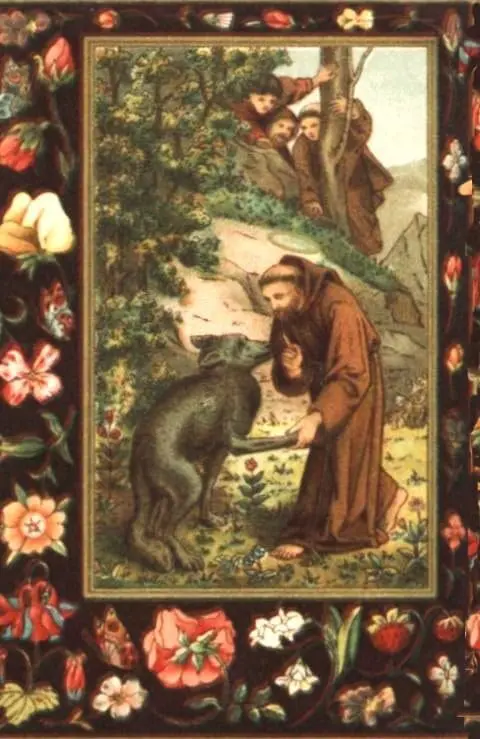
“I warn all the friars and exhort them not to condemn or look down on people whom they see wearing soft or gaudy clothing and enjoying luxuries in food or drink. Each one should rather condemn and despise himself.”
– St. Francis of Assisi
Be strong in the grace that is in Christ Jesus.
– 2 Timothy 2:1
Because the first must be the last
And only little ones may pass
Beyond the gate, narrow and small
Where God is waiting for us all.
Saint Francis, lift my spirit up
I raise to you my empty cup.
As I approach the narrow way
Make me a little one today.
– D. Allen
The Lord will work out His plans for my life; for Your faithful love, O Lord, endures forever.
– Psalm 138:8

Francis had a special love and tenderness for birds, whom he called his “sisters.” On one occasion, he preached a sermon to a number of birds who gathered on the roadside near the town of Bavagna, and they listened to his words with attention. On another occasion, a nightingale responded to his great magnetism and sang with him in an ilex grove. Francis loved robins and swallows and doves and sparrows, but his favorite bird by far, was the lark. The lark was a humble bird. She was satisfied with a few small kernels and seeds, found by the wayside. Her clothing of feathers was humble, the color of the earth. The lark gave the Brothers a good example not to wear showy or fine garments but to dress in a simple and plain manner. Francis loved the sweetness and the beauty of the song of the lark, as she soared heavenward. He told the Brothers that they too, should always sing praise to God, and have their conversation in Heaven. The love that he showed these humble creatures was reciprocated, for it was the larks that paid a special tribute to Francis when he was dying.
“Preach the Gospel at all times and, if necessary, use words.”
– St. Francis of Assisi
We do not preach ourselves, but Christ Jesus the Lord.
– 2 Corinthians 4:5
When Francis was preparing for an audience he was to have with Pope Honorius lll, Cardinal Hugolin gave him some words of advice. Cardinal Hugolin, who venerated Francis as a saint, wanted him to make a good impression on the Holy Father. He was aware that at times, Francis exhibited behavior that was unpredictable and unconventional, to say the least. To Cardinal Hugolin, this was a cause for concern. He told Francis to prepare a speech and study it thoroughly, using it as a framework for all that he would say, and not to deviate from it.
Francis did what Cardinal Hugolin recommended but when the time came for him to stand before the Pope and the entire Roman Curia of Cardinals, he could not remember a single word of the speech he had intended to make. And so instead, he spoke from his heart to the powerful and highly distinguished religious prelates. As he was speaking, he felt a great devotion to God welling up from within and he started to tap his feet. Unable to contain his spiritual joy, other parts of his body began to move and finally he began to dance “in the Lord.” The Pope and the Cardinals did not find his actions objectionable or indiscreet. Quite the opposite, their encounter with Francis left them deeply edified and profoundly moved.
He will baptize you with the Holy Spirit and with fire.
– Luke 3:17
Due to his many chronic illnesses and increasing weakness, Francis appointed Peter of Catana to be the head of the Order of Friars Minor. In addition, Francis decided to no longer have any particular Brother assigned to assist him in his needs or accompany him when he traveled. He said that once he saw a blind man who had just a little puppy to guide him on his way. He did not want to have more than that or to appear singular in any way.
Not to us, O Lord, not to us, but to Your name be the glory. . .
– Psalm 115:1
“My brothers, let us think of the Good Shepherd, who endured the Passion and Cross in order to save his sheep. Our Lord’s sheep have followed him in trouble, persecution and disgrace, in hunger and thirst, in temptation and other hardships, and by so doing have received everlasting life from their Lord. It therefore brings much disgrace on us servants of God that the saints have done great things while we hope to win honor and fame merely by talking and preaching about them.”
– St. Francis of Assisi – The Admonitions
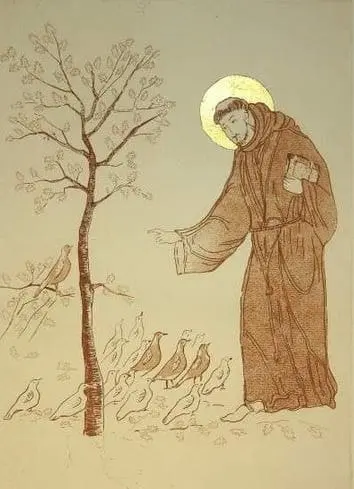
For we do not have a High Priest who is unable to sympathize with our weaknesses, but we have one who has been tempted in every way, just as we are, yet was without sin.
– Hebrews 4:15
Most high, glorious God, cast Your light into the darkness of my heart. Give me right faith, firm hope, perfect charity and profound humility, with wisdom and perception, O Lord, so that I may do what is truly Your holy will. Amen
– St. Francis of Assisi
O Lord God of all, hear our prayer. . . For if we can be with You even one day, it is better than a thousand without You.
– Psalm 84:8,10
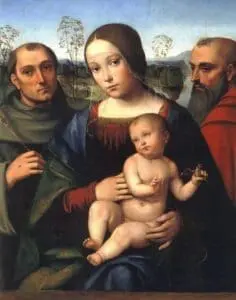
Francis spent the Christmas of 1223 at Greccio, in the valley of Rieti. Before the Holy Day of Christmas arrived, Francis told his friend, John Velita, that he wished to celebrate the birth of the Savior in a special way. He wanted to honor the Nativity of Jesus by setting up a poor stable with live oxen and donkeys and a small creche (crib). There, everyone could meditate on the humble birth of the Infant Jesus in Bethlehem and the hardships of the Holy Family at the time of his birth. John Velita possessed some property that was bordered by a wooded area and he was more than happy to let Francis use his land. Francis obtained permission from the Holy Father, Pope Honorius, for the Christmas memorial. At midnight, the townspeople came from surrounding areas, bearing torches and candles to light their way in the darkness. Francis, wearing the vestments of a deacon, assisted at the Mass and preached on the Christmas mysteries. Some of the hay that had been placed in the manger was later distributed to people who were ill and also for animals that were sick.
The blessings of God were showered down upon everyone on that cold and dark Christmas night. Many of the sick were healed. Francis’ Christmas creche of 1223 began the tradition which has spread throughout the entire Christian world.
Blessed are the poor in spirit, for theirs is the kingdom of Heaven.
– Matthew 5:3
During the time that Francis lived, many of the citizens of Italy would have felt it a privilege to speak to the Emperor, Frederick II, to voice their social, economic, and political concerns. But Frederick II’s imperial position segregated him from the common people. Francis too, expressed a desire to speak to the Emperor, but for reasons all his own. He told the Brothers that if he could ever have the opportunity to speak to the Emperor, he would ask him to have a special ruling that every Christmas, grain would be scattered on the highways for all of the birds and especially for the larks. Donkeys and oxen too, should enjoy a double helping of oats and hay on Christmas day, in memory of the donkeys and oxen who stood at the crib of the baby Jesus.
Jesus, because He remains forever, has a priesthood that does not pass away. Therefore, He is always able to save those who approach God through Him, since He lives forever to make intercession for them. It was fitting that we should have such a high priest: holy, innocent, undefiled, separated from sinners, higher than the heavens.
– Hebrews 7:24-26
After the feast of Christmas, Francis, who was weak and ill at the time, stayed on in Greccio for several more months. He spent much of his time there in prayer and seclusion. Brother Leo, who was his secretary and closest friend, stayed with him in Greccio. During that time, Francis entered such a deep state of prayer, that Brother Leo often saw him elevated above the ground.
The Lord is watching His children, listening to their prayers.
– 1 Peter 3:12
Though Francis had to moderate his early rigor because of his illness, he continued to say, “My brothers and sisters, let us begin to serve the Lord God, for up until now we have done little, or nothing.”
– Thomas of Celano
It is now the hour for us to rise from sleep, because now our salvation is nearer than when we first came to believe.
– Romans 13:12
As time went by, more and more people came to believe in the authenticity of Francis’ life and message. People were attracted to his charismatic personality, his childlike simplicity, and his spirit of prayer. He often liked to pray standing and even if he was sick or in pain, he would pray in this manner, not leaning on anything for support. When he was traveling, at the time for the Divine Office, he would dismount from his horse and begin the Office, standing erect and bareheaded, even in the rain. Once when he was on his way back to Assisi, he was caught in a downpour. Although drenched to the bone, he did not interrupt his prayers. He said to the friars, “If the body wishes to eat its food in peace and quietness, with how much more peace and quiet should the soul receive that food which is God Himself.”
Lord, You know all things; You know that I love You.
– John 21:17
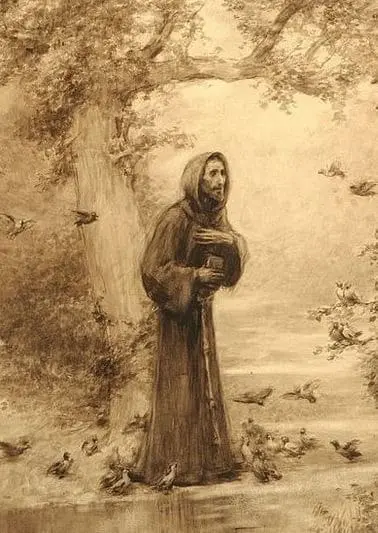
While most people try to hide their defects and shortcomings from others, Francis would accuse himself of his faults openly and make a public confession of his errors. He once said that some of the problems he encountered in his religious Order were the result of his own sins. On the other hand, he always made an effort to hide his virtues as well as the graces that he was receiving from the Lord. “I can still have sons and daughters,” he once said to his admirers. “Do not be too quick to praise me, for my future is not certain,” he said. He felt unworthy of the many graces and favors that the Lord had shown him. He once stated, “If the Lord had shown the favors that He has shown me, to a criminal, he would have made better use of them.”
He has made everything beautiful in its time. Also, He has put eternity in their hearts, except that no one can fathom the work that God does from beginning to end. I know that nothing is better for them than to rejoice, and to do good in their lives.
– Ecclesiastes 3:11-12
“I, Brother Francis, little one, want to follow the life and poverty of the Most High, our Lord Jesus Christ, and of His most holy Mother, and to persevere in this to the end. And I pray to you. . .and counsel you to live always in this same most holy life and poverty.”
– St. Francis of Assisi
I had no gifts to offer you
No talent that I could profess
And yet you called me by my name
And used my brokenness.
And knowing what I could not be
Your mercy reached to cover me
Because I was a broken thing, and small
You lifted me.
– D. Allen
See that you do not look down on one of these little ones. For I tell you that their angels in Heaven always see the face of my Father in Heaven.
– Matthew 18:10
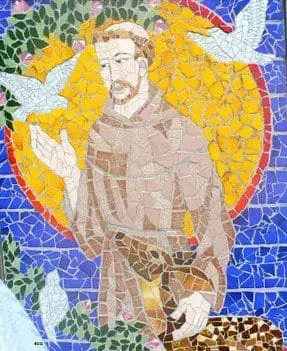
One time a poor man approached one of the Brothers of the Order of Friars Minor, asking for an alms. The Brother said to him, “How can I be sure that you are truly in need. Perhaps you are a rich man pretending to be poor. Why should I believe you?” When Francis, who was often called “the father of the poor,” heard what the Brother had said, he was deeply saddened. He reprimanded the Brother and told him to strip off his habit before the poor man and beg for forgiveness and also to ask the poor man to pray for him. Francis used to say, “He who curses a poor man does an injury to Christ, whose noble image he wears, the image of Him who made Himself poor for us in the world.”
My little children, I am writing these things to you so that you may not sin. But if anyone sins, we have an Advocate with the Father, Jesus Christ the righteous one. He is expiation for our sins, and not for our sins only but for those of the whole world
– 1 John 2:1-2
The abbot of the monastery of St. Justin, in the diocese of Perugia, once asked Francis to pray for him. Francis was happy to agree to his request. Shortly after he took leave of the abbot, Francis said to his companions, “Wait here for me a moment, for I want to fulfill my promise to the abbot and to pray for him.” It was always his habit never to postpone the prayers that people requested of him. While he was praying, the abbot, who was a distance away, began to feel an intense joy rising up in his soul, in a way that he had never experienced before. He felt such a presence of God within that he was carried out of himself. He then realized the power of the Francis’ prayers. The abbot shared with many people, his experience of the wonderful efficacy of Francis’ prayers, and called it a miracle.
We have been called to heal wounds, to unite what has fallen apart, and to bring back home those who have lost their way.”
– St. Francis of Assisi
“St. Francis exerted an irresistible attraction by being learned with the learned, simple with the simple, chivalrous with the chivalrous, most poor among the poor, accusing always himself and never others, castigating the sins and never the persons… surpassing all and yet holding himself to be the least among all. His entire person was a sermon just as his entire life was an example.”
– The Peace of St. Francis
You are a letter of Christ…written not with ink, but by the Spirit of the living God, not on tablets of stone but on tablets of flesh, that is, of the heart.
– 2 Corinthians 3:3
Once when Francis was on his way to Riete, he stopped at the church of San Fabiano. When the townspeople heard that he was visiting the church, they came in great numbers to see him. The crowd was so large that the vineyard that belonged to the parish priest was trampled and completely ruined. When the priest saw the damage that had been done to his vineyard he was very upset and regretted that he had allowed Francis to visit his church. He complained to Francis about the destruction to his land. Francis asked him how many measures of wine the vineyard produced in one year. ‘Thirteen measures,’ the priest answered. Francis promised him that the vineyard would indeed have a plentiful production that season. That year, the vines produced twenty measures of wine, which was greater than ever before.
I will bless them. There will be showers of blessings.
– Ezekiel 34:26
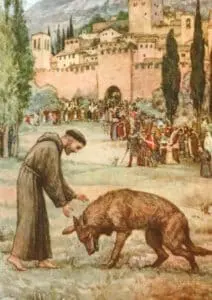
One of the young men who joined Francis’ Order of Friars Minor, knew that Francis often prayed for long hours in the middle of the night while all the other Brothers were sleeping. He knew well Francis’ reputation for holiness, and wanted to see where he went when he left to pray during the night. One night the Brother tied the cord of his habit to that of Francis, so that he would be wakened when Francis went outside to pray. During the night, Francis, seeing what the young Brother had done, untied the cord, and silently slipped out to pray. When the Brother woke up and saw that Francis was gone, he went into the woods searching for the saint. He heard the sound of voices and when he walked toward the sound, he saw Francis, bathed in a beautiful light, and beside him were Jesus and Mary, St. John the Baptist and a host of angels. The Brother fainted at seeing this. When Francis was returning back to the hermitage, he came upon the Brother lying on the ground. He carried the Brother back to the hermitage, and made him promise never to tell anyone what he had seen. The Brother promised and it was not until after Francis’ death, that he told the Friars Minor what had happened.
But blessed are your eyes because they see, and your ears, because they hear. For, amen, I say to you, many prophets and just men have desired to see the things that you see, and have not seen them, and to hear the things that you hear and have not heard them.
– Matthew 13:16-17
One of the spiritual gifts that the Lord had given Francis was the gift of reading hearts. This was made very clear to Brother Leonard on one occasion when he and Francis were traveling together. Francis was very tired from the journey and so had mounted a horse at the advice of his companions. Brother Leonard was walking beside him and he began to think, “Why should Francis ride on a horse while I have to walk. After all, he is the son of Peter Bernardone while I am descended from a family of much greater nobility. I am tired as well. At that moment, Francis dismounted from his horse and said to Brother Leonard, “I don’t think it is right that I should be riding this horse while you have to walk. After all, I am only the son of Peter Bernardone while you are of much more important ancestry. I know that you are tired like I am. Please change places with me.” Deeply embarrassed, Brother Leonard helped Francis back on the horse and determined to keep a careful guard on his thoughts for the rest of the journey.
Lord, deliver me from my distress. See my hardship and my poverty and pardon all my sins.
– Psalm 25:17-18
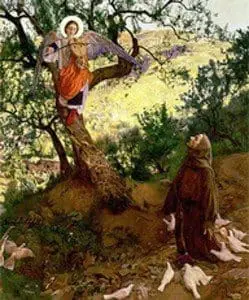
In addition to the gifts of healing, reading of hearts, conversions, discernment of spirits, stigmata, levitation, and miracles, the Lord gave Francis the gift of prophecy. One of the friars who lived with the saint, testified that if Francis said that something would occur at some time in the future, his words were fulfilled to the letter. According to the same friar, there were so many instances of Francis’ prophetic words being fulfilled, that it would have been impossible to recount and record them all. Even though much knowledge was given to him through revelation, he would still seek the opinion of others above his own. He considered the advice of his companions safer and more worthy of consideration.
The word is very near you, in your mouth and in your heart, that you may do it.
– Deuteronomy 30:14
Once a woman spoke to Francis about the suffering she endured at the hands of her husband. Not only was her husband cruel to her but he made every effort to stand in the way of the good works that she attempted to do for the Lord. She asked Francis to pray for her unhappy situation and he assured her that he would. Francis told her, “Say these words to your husband from God and from myself — that now is the day of mercy and that hereafter is the day of justice.” Then he blessed the woman. When she spoke the words to her husband, it brought about a great spiritual change within his soul. He began to serve the Lord with her and their marriage was blessed with happiness for the rest of their lives.
Every morning He brings His justice to light. He never fails.
– Zephaniah 3:5
In the province of Rieti, a very serious pestilence broke out which took the lives of the oxen to such a degree that practically all of the oxen in that region had died. A certain man who lived there had a vision in which he was told that he should hurry to the hermitage where Francis lived and get the water that Francis had used to wash his hands and feet. He was to sprinkle it upon all the oxen. Rising early in the morning, the man went to the place where Francis and the Brothers lived and obtained the water. With the help of his companions, he sprinkled it upon all the oxen. The pestilence ceased from that moment and never returned to that region.
I will sprinkle clean water on them, and they will be clean.
– Ezekiel 36:25
“When he (St. Francis) spoke of illness and weakness, he did not speak about something that he knew only in theory. . .No, he spoke as one who had experienced illness and weakness very deeply. We may be quite certain then, that he stood behind these words without any illusions and with the whole of his person: “There is one thing of which we can boast; we can boast of our humiliations (weaknesses), and in daily taking up the Holy Cross of our Lord Jesus Christ.”…Illness and weakness are not something that can be glossed over lightly. They remain what they always are – a distressing and painful experience. As such, however, they were for Francis…a confirmation of the fact that he was completely accepted by Christ and also that Christ was taking him with him on his way of redemption. In the concrete experience of suffering, the believer knows that the prayer that is said again and again throughout life is being fulfilled, “Let us, through His suffering and Cross, come to glory and resurrection.”
– The True and Perfect Joy of St. Francis
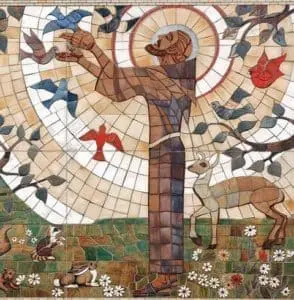
I know that whatever God does, it shall be forever. Nothing can be added to it, and nothing taken from it.
– Ecclesiastes 3:14
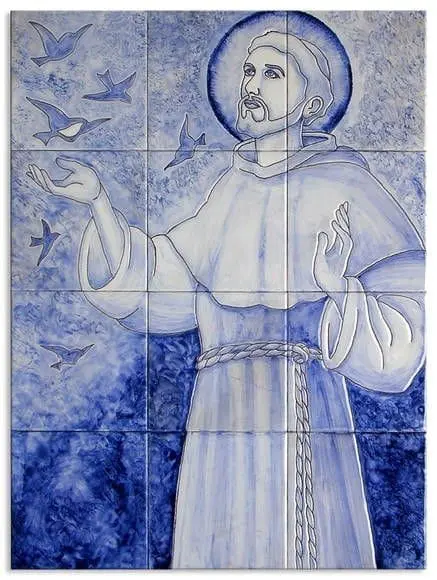
Brother Rufino was greatly loved by Francis and was considered to be one of the holiest of the Friars Minor. Francis once said that God had revealed to him that Brother Rufino’s soul had already been canonized in Heaven. His esteem for Brother Rufino was such that he told the Brothers not to hesitate to call him St. Rufino, even while he was living, for he had found great favor with God. Brother Rufino, of the Scifi family, had been born of the nobility in Assisi. He was shy by nature and was a man of few words. Once when Francis told him to go to Assisi and preach a sermon in the Cathedral, Brother Rufino begged him to send someone else, saying that he did not have the ability to speak before a crowd. Unhappy with his answer, Francis told him to go anyway, but to strip off his tunic and wear only his breeches and speak to the congregation. Brother Rufino obeyed and when he went up to the pulpit and began preaching without a shirt on and stripped down to his breeches, all the people who were in the church burst into laughter.
Although embarrassed and humiliated, Brother Rufino did the best he could to preach, according to his spiritual father’s wishes. Francis deeply regretted his harsh instructions to Brother Rufino and in order to make amends he walked into the church dressed in the very same way. Francis preached with such spiritual power and conviction that the men and women who were present began to weep and there were many conversions. He preached on the kingdom of Heaven and the Passion of Jesus Christ.
Accept whatever befalls you, and in times of humiliation be patient. For gold is tested in the fire, and those found acceptable, in the furnace of humiliation.
– Sirach 2:4-5
“The Church needs reform. She always needs reform, which means she needs scholars and liturgists and committed lay people to help guide her, and pastors who know how to lead with humility, courage, and love. But what she needs more than anything else is holiness–holy priests and holy people who love Jesus Christ and love his Church more than they love their own ideas. Today, just like 800 years ago,(when St. Francis of Assisi lived) the structures of the Church are so much easier to tinker with than a stubborn heart, or an empty hole where our faith should be. Reforming the Church, renewing the Church, begins with our own repentance and conversion, our own humility and willingness to serve–and that’s the really hard work, which is why sometimes so little of it seems to get done. But it can be done. St. Francis of Assisi showed us how. Now it’s up to us to do something about it.”
– Archbishop Charles J. Chaput, OFM Cap
My prayer is that your love may more and more abound, so that you may learn to value the things that really matter, up to the very day of Christ.
– Philippians 1:9-10
Francis was humble in thought, word, and deed. In prayer, he would say to the Lord, “Lord, why have you laid this burden on me? Why have you made a simple, unlettered, wretched creature like me the head of this Order?” And the Lord replied to him, “I have placed a man like you over this Order to show that what I achieve in you is of my grace and not a human accomplishment.”
I know the plans I have for you, declares the Lord; plans to prosper you and not to harm you; plans to give you hope and a future.
– Jeremiah 29:11
“Francis had great compassion for the sick, great concern for their needs…He admonished the ill to bear their troubles patiently and not to give scandal when all their wishes were not satisfied. Wherefore in one of his rules, he had these words set down: “I beg all my sick brothers that they do not become angry in their infirmities or disturbed either against God or against their brothers. Let them not be too solicitous in asking for medicines, nor too desirous that the flesh which is soon to die and which is the enemy of the soul, be delivered. Let them give thanks in all things, so that they may desire to be as God wants them to be.”
– Thomas of Celano
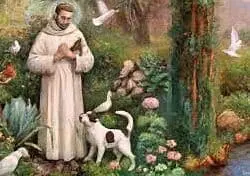
I trust in the mercy of God forever.
– Psalm 52:8
One time, Brother Leo, one of Francis’ closest companions, was suffering a grievous temptation. He longed to have something written in Francis’ own hand but he did not want to ask for the favor and so he said nothing. It was during that time that Francis asked Brother Leo to bring him a piece of parchment and a pen. He wrote on one side, praises to God, and on the other side, a special blessing for Brother Leo. Upon taking the note, Brother Leo was instantly freed from the temptation which had oppressed him. Brother Leo kept the note with him at all times for the rest of his life.
He reached down from on high and took hold of me. He drew me out of deep waters. He rescued me from my powerful enemy, from my foes, who were too strong for me.
– Psalms 18:16-17
When St. Francis was passing through the city of Terni, he preached in the square and the citizens gathered to listen to his message. The Bishop of Terni, also listened to his sermon that day and was deeply edified by his words. The Bishop said to the people, “In this latest hour, God has glorified His church in this poor and despised, simple and uneducated little man.” St. Francis was happy at the Bishop’s words. He fell at the feet of the prelate and said, “In truth, Bishop, you have done me a great favor, because you render to each his own, attributing to God the praise, and to me the worthlessness.”
I praise you, Father, Lord of heaven and earth, because you have hidden these things from the wise and learned, and revealed them to little children.
– Luke 10:21
I trust in the mercy of God forever.
– Psalm 52:8
One time, Brother Leo, one of Francis’ closest companions, was suffering a grievous temptation. He longed to have something written in Francis’ own hand but he did not want to ask for the favor and so he said nothing. It was during that time that Francis asked Brother Leo to bring him a piece of parchment and a pen. He wrote on one side, praises to God, and on the other side, a special blessing for Brother Leo. Upon taking the note, Brother Leo was instantly freed from the temptation which had oppressed him. Brother Leo kept the note with him at all times for the rest of his life.
He reached down from on high and took hold of me. He drew me out of deep waters. He rescued me from my powerful enemy, from my foes, who were too strong for me.
– Psalms 18:16-17
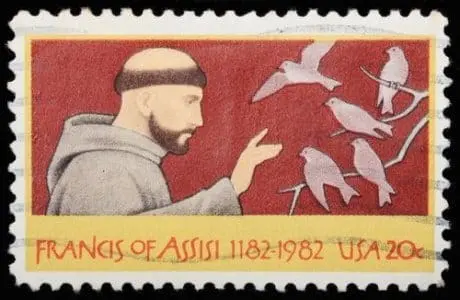
Once, while in San Severino, Francis preached at a convent where a novice was making her religious profession. William of Lisciano, a famous poet, was present at the ceremony, as he was a relative of the nun who was being professed. William, who had been crowned poet laureate by the Emperor, was a worldly man who traveled in worldly circles. He had no interest in the spiritual aspect of life. He had never met Francis before but he listened carefully to his sermon that day and was profoundly moved by it. While Francis was preaching, William saw two glittering crosses extending from Francis’ body. One of the crosses went across
Francis’ chest and the other went from his head to his feet. William was deeply convicted by what he saw and he began to reflect on the state of his soul. He knew that he needed to amend his life, and seek a better way.
Afterward, Francis singled William out and spoke to him. William became the first poet to join the Order of Friars Minor. Because of the great peace that filled William’s heart at the time of his conversion, Francis gave him the name Brother Pacifico (Brother Peace).
I thank Christ Jesus, our Lord, who has given me strength, that He considered me faithful, appointing me to His service.
– 1 Timothy 1:12
Francis knew that book-learning and study could be useful, but he saw the temptations to pride and vanity which often came about through scholarly endeavors and he feared for the spiritual welfare of the Friars Minor. Nevertheless, he had a great admiration for theologians and teachers of sacred scripture. Francis wrote a letter to Anthony of Padua, who joined his Order, saying, “I am pleased that you teach sacred theology to the Brothers, provided that, as it is contained in the Rule, you do not extinguish the spirit of prayer and devotion during study of this kind.” On another occasion he said, “A great cleric must in some way give up his learning when he comes to the Order of Friars Minor, so that he may offer himself naked to the arms of the Crucified.” God illuminated Francis’ mind and heart with a kind of wisdom that could never be obtained by mere book-learning. When a Brother asked him for permission to take a leave of absence to study, Francis told him that if he would often repeat the Glory be to the Father he would become very learned in the eyes of God. He himself was a perfect example of knowledge so attained.
The Holy Spirit whom the Father will send in my name, will teach you everything.
– John 14:26
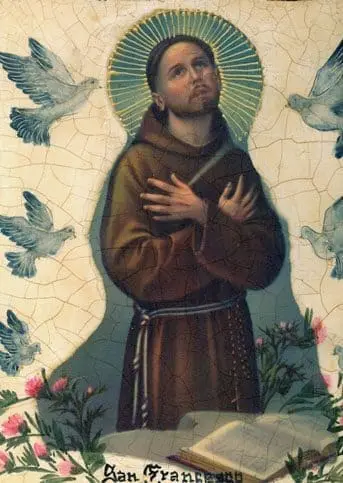
On May 25, 1267, the Feast of the Transferal of the Body of Francis, St. Bonaventure preached a sermon in which he compared the life of Francis to the life of Moses. St. Bonaventure said, “Moses was rescued from the river, and he had to flee from Pharoah, that is to say, he was poor. The Lord gave him nothing other than a staff; no riches, just a staff with which to make his way in the desert. Later he came to be on such intimate terms with the Lord that he spoke with him as a friend. What we read of Moses can be said of St. Francis; the Lord spoke with him as a friend. As Moses was rescued from the river, so St. Francis was saved from the dangerous currents of a worldly life. God gave him the staff of the cross to lead the people out of the Egypt of vice into the desert of the Order of Friars Minor. He carried in his hand nothing other than the staff of Christ’s cross, at the beginning of his conversion, during his life, and at its end.”
Now if you invoke as Father, Him who judges impartially according to each one’s works, conduct yourselves with reverence during the time of your sojourning, realizing that you were ransomed from your futile conduct, handed on by your ancestors, not with perishable things like silver or gold but with the precious blood of Christ as of a spotless unblemished lamb.
– I Peter I:17-20
“This man (Francis) not only despised arrogance with regard to houses, but he also had a great horror of many and exquisite furnishings in the houses. He wanted nothing on the table, nothing in the utensils, that would bring back memories of the world. Everything should show forth our state as pilgrims, everything bespeak our exile.”
– Thomas of Celano
Blessed are the pure in heart, for they shall see God.
– Matthew 5:8
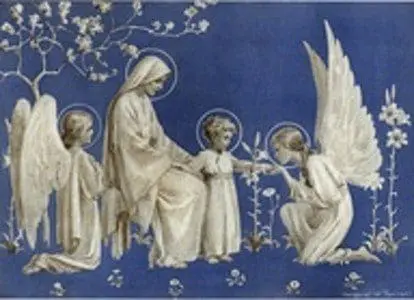
“I should like you to prove that you love God and me, His servant and yours, in the following way: There should be no friar in the whole world who has fallen into sin, no matter how farhe has fallen, who will ever fail to find your forgiveness for the asking, if he will only look into your eyes. And if he does not ask forgiveness, you should ask him if he wants it. And should he appear before you again, a thousand times, you should love him more than you love me, so that you may draw him to God. You should always have pity on such friars.”
– St. Francis of Assisi
Christ is your only teacher. And all of you are brothers.
– Matthew 23:10,8
“Brother Leo, send greetings and peace to your Brother Francis. As a mother to her child, I speak to you, my son. In this one word, this one piece of advice, I want to sum up all that we said on our journey. And in case hereafter, you still feel it necessary to come to me for advice, I want to say this to you. In whatever way you think you will best please our Lord God and follow in His footsteps and in poverty, take that way, with the Lord God’s blessing and my obedience. And if you find it necessary for your peace of soul or your own consolation and you want to come to me, Leo, then come.”
– St. Francis of Assisi
I have prayed for you, that your faith may not fail.
– Luke 22:32
Francis had great love for the Brothers who spent their time in prayer and solitude, interceding for the needs of the world. Their lives were plain, humble and hidden. Although not always understood or esteemed by the people, their holiness of life was known to God. Francis said of the Brothers, “When the souls of these men are presented to the Lord by the angels, the Lord will show them the fruit and wages of their labors in the many souls saved by their example, prayers and tears, and He will say to them, “My beloved children, look, so many souls have been saved through your prayers, tears, and example. Because you have been faithful over a few things, I will place you over many things.”
Those who are wise, will shine like the brightness of the heavens, and those who lead many to righteousness, like the stars for ever and ever.
– Daniel 12:3
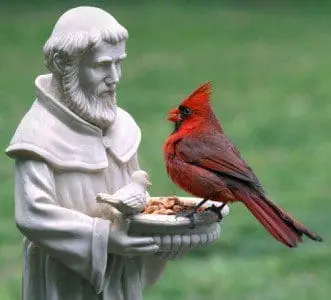
Francis meditated on the poverty of Christ’s birth and the poverty of His death, stripped of His garments and nailed to a cross. This became the model for his own life. He would be poor because Christ was poor. The Friars Minor had no land, no income, no possessions beyond what was needed for daily life and the Brothers were forbidden to accept money under any conditions. On these points, Francis was uncompromising. He called the spirit of holy poverty, the foundation of the Order.
Rejoice to the extent that you share in the sufferings of Christ, so that when His glory is revealed you may also rejoice exultantly.
– 1 Peter 4:13
St. Francis sent the Brothers out two by two to preach the Good News of Jesus Christ. He gave them wise counsel before they departed and said: “Dear Brothers, God in His great mercy called us not only for our salvation but for that of many; and so we are to go through the world encouraging all men and women by our example and words to do penance for their sins and to keep God’s commandments. Don’t be afraid to preach penance, even if you appear ignorant and not worth listening to. Put your trust in God, who by the Holy Spirit, will speak through you. . .You will find some men are devout and kind, while others who are proud, faithless and blasphemous, will insult and injure you. But don’t be frightened. Many noble and wise men will join us; kings, princes and many others will be converted. . .and our family will increase all over the world.” St. Francis told the Brothers that if they were asked who they were they were to answer that they were the “penitents from Assisi.”
You are a hiding place for me; You preserve me from trouble; You surround me with songs of deliverance.
– Psalm 32:17
“The love of God gave St. Francis that consoling power which, after seven centuries, made the whole world follow after him. . .If, in his time, he penetrated everywhere, into castles and hovels, into bishopries and tiny parishes, and went through the public squares as through the countryside, bringing all to the Lord with his art of living, today even more are attracted to him either for the one or the other aspect of his sanctity. He who does not love him for his penance, loves him for his poetry, and he who does not understand him as a saint admires him as a reformer of customs and a benefactor of mankind. And he who does not share his conception of life, would still like to share his perfect joy. Thus the legacy of St. Francis, of which the Church alone is the custodian as a whole, endures and spreads in the world.”
– The Peace of St. Francis
All the days planned for me were written in Your book before I was born.
– Psalm 139:16
“Francis desired no house, no safe stronghold, no cloister, no possessions, no privileges; all these things he saw as fetters, links with the affairs of the world. His brotherhood was to be defenseless, exposed….Christ’s friends and disciples on earth should remain in complete poverty, without possessions and without legal protection….He (St. Francis) did not waver from his position. “I strictly command all the brethren on obedience that….they shall not dare to ask for any letter from the Roman court….neither for purposes of preaching nor because of any persecution of their bodies.”
– Friedrich Heer
They were longing for a better country, that is, a heavenly one. Therefore God is not ashamed to be called their God, for He has prepared a city for them.
– Hebrews 11:16
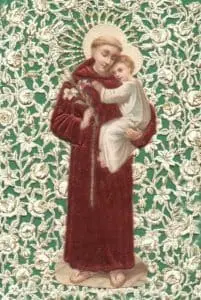
Francis was guided by divine wisdom in his relationship with those who had joined his Order of Friars Minor.To one of the Brothers who lacked understanding regarding the difference between temptation and actual sin, Francis said, “It is not the temptation but the giving in to it, that requires confession.” He consoled another Brother by saying, “The more you are tempted, the more I will love you.” Regarding the Brothers who left the Order, Francis said that those who renounced their religious vows and abandoned their vocation should be treated with a special mercy since the difficulties and temptations which caused them to leave, must have been overwhelming.
His (St. Francis’) concrete reality was God, his thought never strayed from Him, it lived in Him…The more he grew in perfection, the more he felt the need to abandon himself without reserve to his God, in solitude. – The Peace of St. Francis
I will try to walk a blameless path, but how I need your help.–Psalm 101:2
As time passed, more and more people came to know of Francis’ reputation for holiness, and during his lifetime he was venerated as a saint. The church bells would be rung when he entered a town, and with great joy, all of the townspeople would go out to meet him. Children would be waiting for him, holding flowers in their hands. One of the Brothers who observed the peoples’ devotion to Francis, found it to be excessive. He told Francis, “It is not good how the people display their love for you. It is not good for them and it is not good for you.” Francis said to the Brother, “This reverence that the people pay me, I never take to myself. I pass it all on to God.”
“Francis venerated with a very great affection, the angels who are with us in our struggle and who walk in the midst of the shadow of death with us. Such companions who were everywhere with us, he used to say, are to be venerated, such are to be invoked as our guardians. He used to teach that their presence must not be offended, and that we must not presume to do before them what we would not do before people.” – Thomas of Celano
See, I am sending an angel before you, to guard you on the way and bring you to the place I have prepared.
– Exodus 23:20
Two years before his death, Francis retreated with three of his companions, to the mountainous and rocky region of La Verna, in the Tuscan Apennines. His great desire was to spend his time at La Verna in prayer and solitude and to make a forty day preparation for the feast of St. Michael the Archangel, to whom he had a great devotion. Francis stayed in a tiny hut that had been provided for him and desired to remain in seclusion until the Angel’s feast day on September 29.
One morning, while he was praying, he had a vision in which he saw a Christlike figure in the sky, moving toward him. As the figure came closer, he saw that it was suspended on a cross and that it had six shining wings, like the wings of an angel. As he gazed at the angelic being, suffused with a fiery light, he felt both a great joy and a great sorrow, joy because of the beauty of the apparition, and sorrow because the figure was crucified. As he looked in wonder, the wounds that Christ suffered in his Passion, appeared on his own hands, feet, and side. It was September 14, 1224, the feast of the Exaltation of the Cross. Francis became the first known person in history, to receive the stigmata.
It is no longer I who live, but Christ who lives in me.
– Galatians 2:20
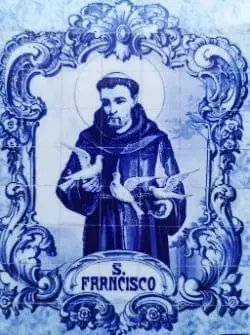
After the feast of St. Michael the Archangel, Francis left La Verna. Greatly weakened by the wounds of the stigmata, he rode down the mountain on a borrowed horse. There were people waiting to see him in the plain below, and a number of the sick who were brought to Francis, were healed of their infirmities.
I love the Lord because He heard my voice; He heard my cry for mercy.
– Psalm 116:1
Francis made every effort to conceal his stigmata, by pulling the sleeves of his habit down over his hands and by wearing shoes and woolen socks. It was very difficult for him to walk on his pierced feet. Some of the brothers who were closest to him, on occasion, saw the wounds of the stigmata in his hands and feet. Thomas of Celano, who knew the saint personally and was the first to write his biography, tells us that only one of the brothers had the privilege of seeing the wound in his side. Whenever Francis had his habit cleaned, he would cover his pierced side by putting his hand over it. Once as Francis was taking off his habit to be cleaned, one of the Brothers saw the side wound. Everyone else saw it only after his death.
Christ’s love is greater than anyone can ever know but I pray that you will be able to know that love.
– Ephesians 3:19
Sacred Heart of Jesus, filled with infinite love, broken by my ingratitude, pierced by my sins, yet loving me still, accept the consecration that I make to You, of all that I am and all that I have. Take every faculty of my soul and body, and draw me, day by day, nearer and neared to Your Sacred Side, and there, as I can understand the lesson, teach me Your blessed ways. Amen
The steadfast love of the Lord never ceases. His compassions never fail; they are new every morning. Great is Your faithfulness.
– Lamentations 3:22-23
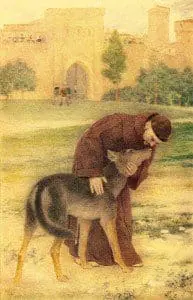
“Though he (St. Francis of Assisi) exhibited the greatest esteem for all men and rendered each man every possible deference, he looked upon himself as a sinner, considering himself as only one among many sinners. In fact, he believed himself the greatest of all sinners. He was accustomed to say that if the mercy shown him by God had been given to any other sinner, the latter would have become ten times holier than he, and that to God alone must be attributed whatever was found in him of goodness and beauty, for from God only was it derived. For this reason he tried in every possible way to hide those privileges and graces, especially the stigmata of Our Lord, imprinted on his body, which might have gained for him the esteem and praise of men. When at times he was praised, either in public or in private, he not only refused to accept such praise but protested that he was worthy only of contempt and abuse and was really saddened thereby. Finally, what must we say about the fact that he thought so humbly of himself that he did not consider himself worthy to be ordained a priest?”
– Pope Pius XI – from Rite Expiatis
When you pass through the waters, I will be with you; and when you pass through the rivers, they shall not overflow.
– Isaiah 43:2
In the city of Narni, a man named Peter, who was paralyzed and bedridden, heard that Francis would be passing through the city. He had great faith in Francis so he sent a messenger to the Bishop requesting that the saint stop by his home and visit him. Francis visited Peter and when he made the sign of the cross over his body, Peter was healed of his paralysis.
For we are saved by hope. But hope that is seen, is not hope. For what a man sees, what does he hope for? But if we hope for what we do not see, we wait for it with patience.
– Romans 8:24-25
Once when Francis was suffering from a long and painful illness, one of the Brothers convinced him to eat a bowl of stew. It has been specially prepared for him, in hopes that his body would be strengthened thereby. Afterward, Francis regretted eating the meal and felt like a hypocrite because by word and action he was ever encouraging people to practice penance and self-denial. He went to the town square and said to the people who were gathered there, “You think I am a holy man but you are wrong. I confess to you and to God that during my illness I indulged in eating chicken and some stew.” On that winter’s day, Francis had a fever and was extremely weak. A number of people who heard his words began to weep, seeing him exposed to the cold weather and knowing how ill he was. The people said to themselves, “This man has done nothing wrong. He accuses himself of a fault but all he did was try to care for his health. What will happen to us, we who satisfy our every desire and enjoy so many pleasures?”

God forbid that I should glory, save in the cross of our Lord Jesus Christ by whom the world is crucified to me and I to the world.
– Galatians 6:14
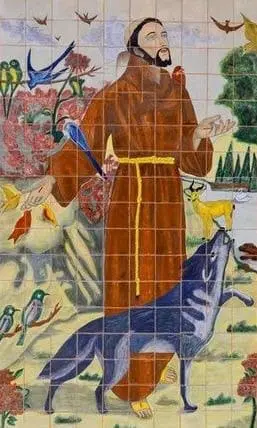
“And you who shall observe these things, may you be filled in heaven, with the blessing of the Most High Father, and may you be filled on earth with the blessing of His Beloved Son together with the Most Holy Spirit the Paraclete and all the powers of heaven and all the saints. And I, Brother Francis, the littlest of the brothers, and your servant, as far as I am able, confirm for you within and without, this most holy blessing.”
– The Testament of St. Francis
When we were unable to help ourselves, at the moment of our need, Christ died for us.
– Romans 5:6
“O how beautiful, how splendid, how glorious did he (St. Francis) appear in the innocence of his life, in the simplicity of his words, in the purity of his heart, in his love for God, in his fraternal charity, in his ardent obedience, in his peaceful submission, in his angelic countenance.”
– Thomas of Celano
The trust you have shown shall not pass from the memories of men, but shall ever remind them of the power of God.
– Judith 13:25
Cardinal Hugolin of Ostia, had a great admiration for Francis. He said that just to look at Francis, always uplifted his spirit. The Cardinal testified that whenever he was disturbed or upset by problems and difficulties, he had only to speak to Francis briefly or glance at him, and his peace of mind would return at once. He considered Francis as an apostle of Christ, and in his reverence for him, the Cardinal would often take his hand and kiss it. Knowing the great amount of good he was doing for the Church and for the world, Hugolin begged Francis to take better care of his health.
You know how we lived among you for your sake. You became imitators of us and of the Lord; in spite of severe suffering, you welcomed the message with the joy given by the Holy Spirit. And so you became a model to all the believers.
– 1 Thessalonians 1:5-7
Francis never enjoyed good health and his physical infirmities increased as time went by. On one of his missionary journeys to the Middle East, he contracted trachoma, an eye disease which was prevalent in Egypt and which caused his eyes to be painfully inflamed and swollen. He kept the hood of his habit pulled down over his eyes because the light of day caused him great discomfort.
Cardinal Hugolin of Ostia, concerned about Francis’ failing eyesight, persuaded him to travel to Reite and consult the Pope’s physician. The agonizing treatment consisted of cauterizing his forehead from his temple to his ear with a red hot iron along with the use of plasters to keep the wound open. How did Francis respond to this trial? The same way he responded to all the other trials in his life. He accepted it without a trace of bitterness or self-pity and maintained his spiritual joy throughout. He regarded his sufferings as a purification and always spoke of them as such. He composed the beautiful and triumphant poem, “Canticle of the Sun,” a hymn of praise to God, toward the end of his life, when he was blind and undergoing intense and unrelenting physical pain.
Hope in God, for I will yet praise Him.
– Psalm 42:5
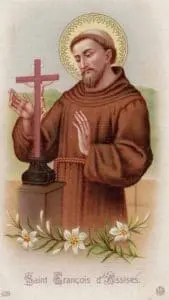
I’ve known laughter, days of fun
had many hours in the sun.
been to many mountains – walked along the
ocean shore. I’ve seen rainbows fill the sky
counted stars on a summer’s night
oh, so many moments that have filled my soul with joy. But it’s been the rain,
it’s been the storms, it’s been the days
when I’ve been worn, that I have found You, Lord, that I have seen You, Father.
It’s through the pain that I have grown
through all the sorrows I have known.
But if that’s what it takes for You
to lead me this far
go ahead and break my heart.
– Kathy Troccoli
Create in me a clean heart, O God, and renew a steadfast spirit within me.
– Psalm 51:10
Francis spent the last days of his life dictating his spiritual testament, which he described as a “reminder, a warning, and an exhortation,” and in which he recounted how the Lord had led him in his ministry to souls. In his early years, he had always had a horror of leprosy, but he marks the turning point in his life, and his moment of true conversion to God, when he was able to serve and care for those with leprosy. He said, “This is how the Lord gave grace to me, Brother Francis, to begin to do penance. When I was still in sin, it seemed a very bitter thing to me to look upon people with leprosy. But the Lord brought me among them, and I lived with them awhile. When I left them, what had seemed to me bitter, was turned to sweetness in my soul and body. After that I lived little in the world. I left it behind me. The Lord gave me such faith in his churches that I would pray there simply, saying, “We adore you, most holy Lord Jesus Christ, here and in all your churches throughout the world. And we bless you, for by your holy cross you have redeemed the world.”
The message of the cross is foolishness to those who are perishing, but to us who are being saved, it is the power of God.
– 1 Corinthians 1:18
In his final illness, Francis remained united to God and to the spirit of joy that had so characterized his life. Although his body was wracked with pain, he felt a greater need to sing than ever before and he asked the Brothers to sing the psalms. Brother Elias, who had been appointed the Vicar-General of the Order, was worried about public opinion. He did not think it was right to have songs of praise being sung, when Francis was near to his departure from this world.
A large crowd had assembled outside, knowing that Francis was close to death. Brother Elias feared that they would have a poor opinion of Francis. He went to Francis’ bedside and warned him not to give sandal to the people. He said, “There is a watch set down below. A crowd is gathered there, knowing how serious your condition is. They will not think you are a holy man if they hear music coming from your cell .They will assume that you are not taking your death seriously. What will the faithful think of your sainthood, if you do nothing but sing?” Francis answered the superior of his Order, “Suffer me, Brother, to rejoice in my Lord, both in His glory and in my infirmities, since by the grace of His Spirit, I feel so united to Him.”
Stand firm and see the deliverance the Lord will give you.
– 2 Chronicles 20:17
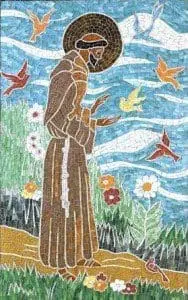
“St. Francis spent the few days that remained before his death in praise, teaching his companions whom he loved so much to praise Christ with him. He also invited all creatures to praise God.”
– Thomas of Celano
My presence will go with you and I will give you rest.
– Exodus 33:14
“But think of the harvest from these labors, my son. Think of the end that will soon come, and the very great reward to follow. Then you will not feel any burden, but will experience strong comfort in your patience. For in place of the insignificant will of yours, which you now resign of your own accord, you will have your will in Heaven always. There you will have everything you want, everything you can desire.”
– Thomas a’ Kempis – The Imitation of Christ
Our citizenship is in Heaven.
– Philippians 3:20
In the last moments of Francis’ life, when he knew that his death was imminent, he repeated, as well as he could, – Psalm 141:
I cry aloud to the Lord;
I lift up my voice to the Lord for mercy.
I pour out my complaint before Him.
When my spirit grows faint within me,
it is You who know my path.
In the way where I walk, men have hidden a snare for me.
Look to my right and see;
no one is concerned for me.
I have no refuge; no one cares for my life.
I cry to you, O Lord;
I say, “You are my refuge,
my portion in the land of the living.”
Listen to my cry,
for I am in desperate need;
rescue me from those who pursue me,
for they are too strong for me.
Set me free from my prison
that I may praise Your name.
Then the righteous will gather about me
because of Your goodness to me.
When Francis was dying, a large number of larks perched on the roof of his cell and began singing. The lark had always been Francis’ favorite bird. Although it was evening, when the larks characteristically do not come out, they were all there, making their voices heard. The city watchman who guarded the area and a number of other witnesses were astonished at the occurrence and considered it a miracle.
I will bless You as long as I live; I will lift up my hands and call on Your name.
– Psalm 63:5
“May my heart always be open to little birds, who are the secrets of living. Whatever they sing is better than to know. And if men should not hear them – then men are old.”
– E. E. Cummings
Rejoice, because your names are written in Heaven.
– Luke 10:20
Francis told the Brothers, that when his last hour came, he wanted to be laid naked on the bare earth, in imitation of the Lord. In his final moments, his habit was removed and he was laid on the ground and covered with a borrowed cloth. The Lord’s Passion, according to the gospel of St. John, was read to him at his request. He said to his companions, “I have done what was mine to do; may Christ teach you what you are to do.”
I want to know Christ and the power flowing from His resurrection; likewise to know how to share in His sufferings, becoming like Him in His death. Thus do I hope that I may arrive at the resurrection from the dead.
– Philippians 3:10-11
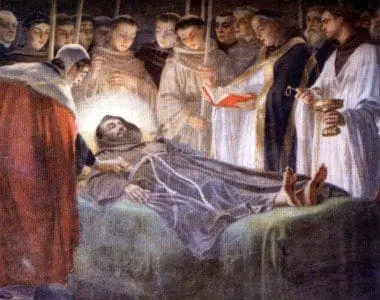
“Nothing was to be lacking in the life of the Poverello (Francis) to make it a perfect masterpiece, and his death was the harmonious culmination of his life. His last weeks on earth were like the close of a beautiful day, wherein the setting sun seems to shed on the world, all its remaining splendor. Thus, before leaving his friars, Francis expressed to them once more, his most intimate thoughts, poured out upon them all his tenderness, and then, serene and filled with gratitude, went home to God.”
– Omer Englebert
O death, where is thy sting? O grave, where is thy victory?
– 1 Corinthians 15:55
After suffering through a long illness, Francis welcomed with love, his entrance into eternal life and what he came to call, “sister death.” He died on October 3, 1226. He died painfully and he died singing.
For to me, to live is Christ, and to die is gain.
– Philippians 1:21
Francis had asked to be buried in the criminals’ cemetery in the Colle d’Inferno. Instead, he was taken in procession, to the church of St. George, in Assisi, where he had first preached. The marks of the stigmata on his body, which he had been so careful to keep hidden during his life, were now visible to all.
Fear the Lord and serve Him faithfully with all your heart. For consider what great things He has done for you.
– 1 Samuel 12:24
“All praise be Yours, my Lord, for our Sister Bodily Death, from whom no living person can escape. Woe to those who die in mortal sin. Blessed are those whom death will find in Your most holy will, for the second death shall do them no harm.”
– St. Francis of Assisi
“Teach everyone the spirit of St. Francis which is the spirit of Jesus Christ.”
– St. Pio of Pietrelcina
“While St. Francis embraces death as a sister, he in no way sentimentalizes death. He sees death as an inevitable finale to life; the fate of every person. His mind, however, immediately turns to something worse than death, dying outside the grace of God. . .Death for St. Francis, had an eschatological meaning. It was a transit either to God or away from God.”
– Lawrence Cunningham
None of us lives as his own master and none of us dies as his own master. While we live we are responsible to the Lord, and when we die, we die as His servants. Both in life and death, we are the Lord’s.
– Romans 14:7-8




